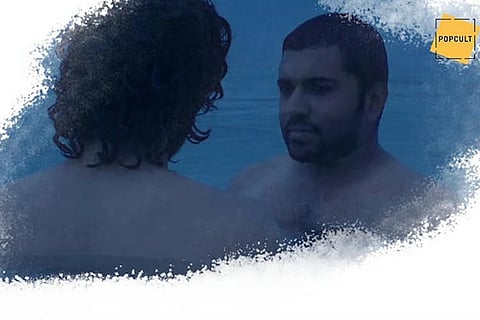

For decades, commercial Malayalam cinema has showered us with scores of cookie-cutter male protagonists - the mass ‘hero’ who oozes masculinity, twirls his moustache, beats up a 100 goons and wins over the unsuspecting female lead.
This template has been used and reused so much that when a real and well-etched male character finally comes alive in a rare appearance, it becomes a breath of fresh air.
There is nothing shameful in asking to be loved:
Dasharatham, the 1989 film directed by Sibi Malayil with Mohanlal in the lead, was far ahead of its times in dealing with the idea of artificial insemination. Not only did the film portray the subject with sensitivity, it also gave us the heart-wrenching climax scene, where an emotionally distraught Rajiv asks Sukumari (his domestic worker) if she would love him like her own son.
Rajiv does not wait for an answer as he walks away with tears in his eyes.
Never trivialise sexual assault on young boys/men, hold them close
Sexual assault on men or boys is seldom treated with the gravity it deserves on screen. Often times, commercial films especially comedy capers, use sexual abuse on boys/men as material for homophobia or homophobic jokes.
In Koode, director Anjali Menon conveys the trauma of Joshua’s experience to the audience with utmost sensitivity. With her ‘less is more approach’, she subtly broaches the painful subject without actually going into the details of Joshua’s abuse. And in doing so, she captures the real and painful scars that Joshua carries with him.
Being scared and emotional are part of life
Mammooty takes a break from playing a tough cop in this 2019 Malayalam black comedy, Unda. Sent to Chhattisgarh on election duty, Mammooty heads a team of officers who face a Naxal attack. The lead officer freezes during the attack out of fear, and later admits that he lost his nerve to his team.
Household chores is a man’s responsibility as it is anyone else’s
In Varathan, a 2018 film directed by Amal Neerad, Fahadh Faasil plays a caring and responsible husband to Priya Paul (Aishwarya Lekshmi). A particular scene when the couple shifts to Priya’s sprawling ancestral estate in Kottayam shows Aby brewing tea and serving his wife as well as the caretaker in the morning. What may seem like an insignificant scene, is in fact, a successful attempt at taking down gender stereotypes in commercial cinema.
Obsession, possessiveness and gaslighting are not out of love, it is toxic
For perhaps the first ever time in modern Malayalam cinema, toxic relationships, gaslighting and possessiveness were portrayed for what they are. In Uyare, the 2018 Parvathy starrer, director Manu Ashokan simply refused to gloss over the toxicity in man-woman relationships and called a spade a spade.
Asif Ali convincingly portrays Manu, the insecure boyfriend who does not skip an opportunity to gaslight his girlfriend Pallavi (played by Parvathy), which finally leads to a brutal acid attack on the protagonist.
Walk away when she says NO, even if it hurts
The 2017 romantic thriller Mayaanadhi was lauded for reversing the traditional ideas of romance. Here, Maathan (Tovino Thomas) and Appu (Aishwarya Lekshmi) are in an on-again off-again romance, having known each other from the time they were teenagers.
While Appu is an aspiring actor, Maathan is a goon for hire. When he realises that the police are on his trail over a murder, he asks Appu to leave with him. She says no, and he walks away, heartbroken but respectful of Appu’s decision.
Sometimes a ‘complete man’ is scarier than an imperfect man
The much loved 2019 film Kumbalangi Nights, which narrated the lives of four brothers living in the picturesque village of Kumbalangi, has Fahadh Faasil playing the bad guy. Shammy is the ‘complete man’, who is impeccably pruned and well-dressed. He is the head of a family of three women and considers himself to be responsible for their honour. While several men like Shammy have been portrayed in Malayalam cinema before, it is the difference in treatment of this character that makes us cringe in discomfort every time Shammy appears on screen.
In Kumbalangi Nights, the complete man is the villain, unlike several films where patriarchy has been glorified and normalised.
Love is beyond the mores of society, embrace love
Without revealing spoilers, Moothon - directed by Geethu Mohandas, breaks away from how Malayalam cinema has usually portrayed queer identities. While films like Chanthupottu, directed by Lal Jose, have spread misconceptions with its problematic portrayal of gender and sexuality, in Moothon, Geethu Mohandas gets it absolutely right.
It’s okay to get help when the going gets tough
Towards the end of Kumbalangi Nights, we see a distraught Saji (played by Soubin) who is ridden with guilt following his friend’s death. He visits a psychologist to seek help for his problem. As the conversation extends well beyond his allotted appointment and continues for hours, Saji breaks down, hugs the psychologist and wails in agony.
The poignant scene not only leaves the audience in tears, but also conveys an important message - it is perfectly fine to seek help when the going gets tough.